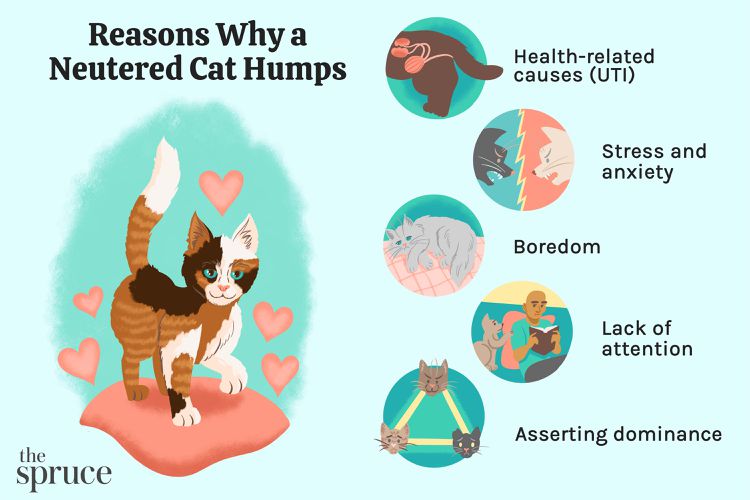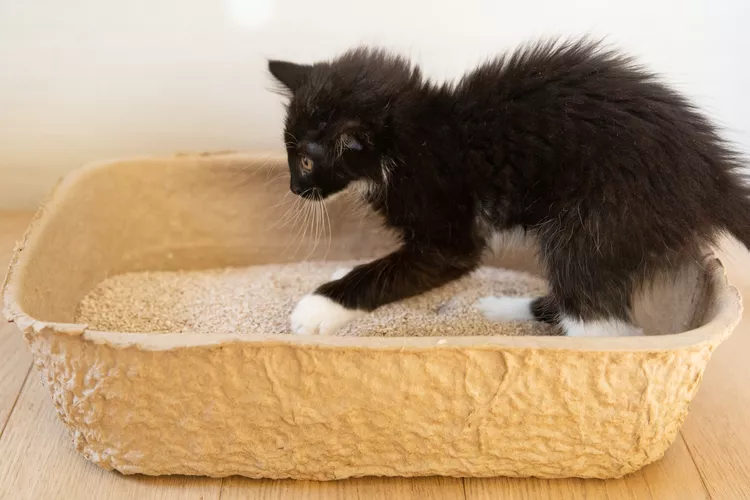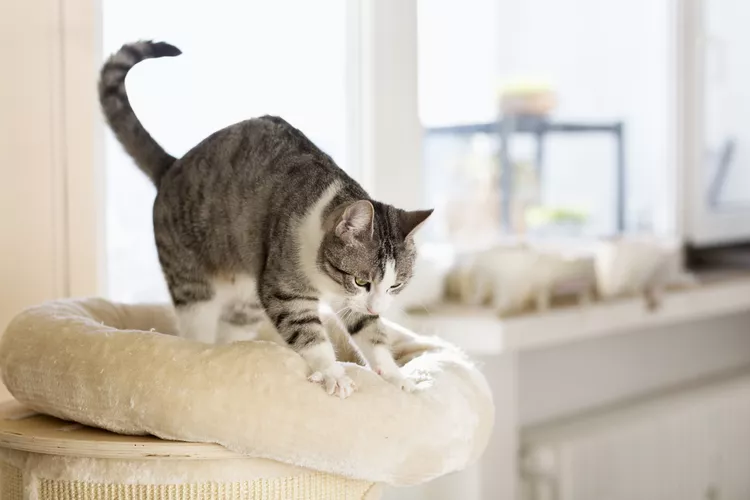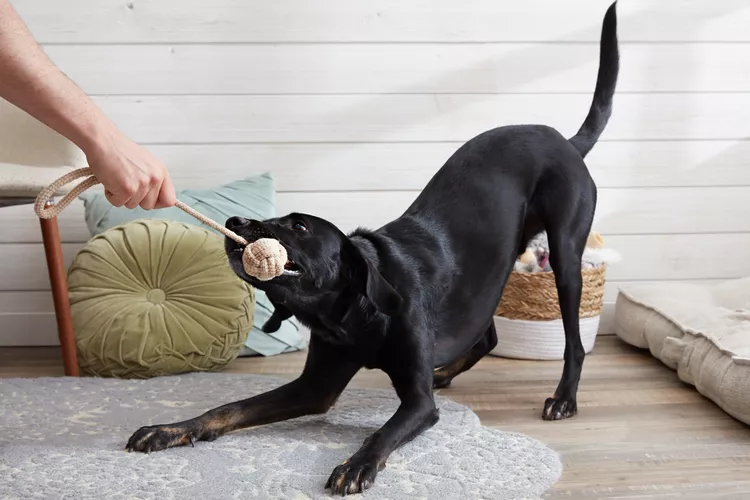
Cat humping isn't uncommon, even for neutered male cats. They'll hump other cats (and even inanimate objects) because of urinary tract infections, stress, or other health and behavioral reasons. This can result in stress for both you and the second cat, who may not want to be stalked and mounted.
If a fixed male cat is regularly humping another cat, there are a few ways you can find out what's going on and stop or manage the humping. Here's what cat humping means—and ways to prevent the behavior.
Neutering may not automatically stop a male cat from mounting (grasping with his forepaws, gripping her neck with his teeth) and humping other cats. The behavior may be due to health issues, your cats' social hierarchy, or other problems.
Humping behavior is normal for whole (sexually intact) male cats. Even after castration surgery, it takes time for the hormones to leave the body, and it's not unusual for mounting to continue for at least a few weeks after the procedure—if not longer.
Urinary tract infections may also lead to humping behavior in some cats.
It’s always best to first have your veterinarian rule out health issues. If it turns out your cat is physically healthy and the humping behavior has been consistent, it's likely a behavioral issue.
Cat humping can be related to stress and anxiety. This is most likely when something has recently changed in the cat's environment: the addition of a new family member, a move, or even a neighborhood cat appearing in the window. Boredom is another cause of humping in cats.
However, cats also use mounting behavior as a way to reinforce social ranking. Cats reach social maturity between the ages of 2 and 4 years. Before that, they may get along famously, and then suddenly the cats’ social ranking starts to matter. Your male cat's stalking, mounting, and chasing your other cat away from important resources may reflect territorial issues or pushy behavior.
If a medical cause is found for your cat's humping, your veterinarian will recommend the best course of treatment. Behavioral causes can be somewhat more difficult to solve. You'll need a good understanding of how the cat world works so you can work with (rather than against) the natural instincts of your feline family members. You may need professional help in some cases, so ask your vet for a referral to a certified animal behaviorist.
Make sure your cat is getting all the attention, mental stimulation, and exercise he needs. Play with your cat every day. If you pinpoint a source of stress, do what you can to relieve it.
If you see your cat getting ready to hump, try to redirect his attention to something else. Offer a toy or play a game with the humping cat so he'll leave your other cat (or you) alone. However, do not punish or yell at your cat as this will only increase stress levels, which may lead to more humping and mounting.
Find ways to reward your male cat's good behavior. You can do this with treats, toys, or extra attention when he's calm and interacting nicely with your other cats. This is much more effective than common discipline techniques, such as squirting him with water or yelling. Of course, you should never hit your cat.
Giving your cats more space to increase their respective territories can help as well. Cats love to climb, so provide separate cat trees and window perches for each to claim. You can even have fun by installing elevated walkways for your cats to explore.
Sometimes, you also need to provide each cat with their own personal spaces for basic needs. Try to place food and water bowls in different locations so they're not fighting over resources. You should also follow the litter box rule of "two plus one," meaning that you need three boxes for two cats. Make sure these aren't within sight of each other to quell tensions and give all kitties their privacy.

212 Hairless Cat Names For Your Beautifully Bald Feline
Discover the perfect name for your hairless cat with our list of over 200 creative and unique names. From quirky to classic, find a fitting choice for your beautifully bald feline companion.
8 Things Your Cat Loves
Just like humans, cats can have a long list of things they like. Find out what cats love so you can keep your cat happy and healthy.
How to Tell If a Kitten is a Boy or a Girl
If you're wondering whether your new kitten is a boy or a girl, here are three ways to help determine the sex of your cat.
8 Tips to Help Cats Enjoy Car Travel
Cats are creatures of habit, and they hate to travel. Learn tips to prepare them for travel in the car, whether going to the vet or on vacation.
Common Causes of Mucus in Dog Poop
Seeing mucus in your dog's poop can be concerning to a dog owner. Here are common causes and treatment of mucus in a dog's stool.
Is Shrimp Bad For Dogs?
Shrimp can be a healthy, nutritional food for people but can dogs eat them, too? What are the main concerns with feeding shrimp to your dog?
Can Dogs Eat Grapes?
Are grapes safe for dogs? Grapes and raisins can cause serious toxicity in dogs. Find out what to do if your dog eats grapes.
Maine Coon Cat: Breed Profile, Characteristics & Care
The Maine Coon cat is of the largest cat breeds in the world. These amiable, gentle cats make great companions. Learn about the Maine Coon cat breed's appearance, temperament, health, and care needs.
Selkirk Rex: Cat Breed Profile, Characteristics & Care
The Selkirk Rex is a charming cat with a tousled coat and a loving, laid-back personality. Learn about the Selkirk Rex breed.
How to Stop Your Cat From Chewing Electrical Cords
Cats are known to pounce and attack inanimate objects, like electrical cords. Learn how to prevent your cat from ambushing objects that may harm it.
What Do Cats Think About?
Have you ever wondered what cats think about? A number of studies have explored cat behavior and feline cognition, but there's still more to learn.
Training Your Kitten to Use the Litter Box
Bringing home a new kitten means they need to learn how to properly use a litter box. Discover how to successfully litter box train your kitten.
Why Do Cats Knead?
Kneading is a common behavior in cats of all ages. Learn why cats "make biscuits" and what it means for you, your cat, and all your blankets.
Dandie Dinmont Terrier: Dog Breed Characteristics & Care
Learn about the Dandie Dinmont Terrier, a silky dog breed with a signature puff of hair atop its head and a friendly, companionable personality.
Tibetan Mastiff: Dog Breed Characteristics & Care
Learn about the Tibetan mastiff, an ancient guardian dog breed. This breed is known for their massive stature, flowing mane, and protective personality.
4 Reasons Why Your Dog Licks Their Butt
Butt-licking in dogs can be a part of normal grooming, but excessive butt-licking is not normal. Read about the most common reasons for this behavior.
How to Teach Your Dog the "Leave It" Command
Training your dog the "leave it" command is a great way to instill self-control. Learn how to teach your dog to not pick things up from the ground.
How to Solve Your Dog's Fear of Car Rides
Is your dog scared of car rides? This fear of riding in cars is common. Learn why your dog is scared of car rides and how to help conquer this fear.
Can Dogs Get Depression? How to Help Your Sad Dog
Can dogs get depression? Learn about the signs of depression in dogs and find out how to help your sad dog.
How to Play Tug of War With Your Dog
Many dogs love to play tug of war, and it's a healthy game that provides great exercise. Learn the best way to safely play tug of war with your dog.